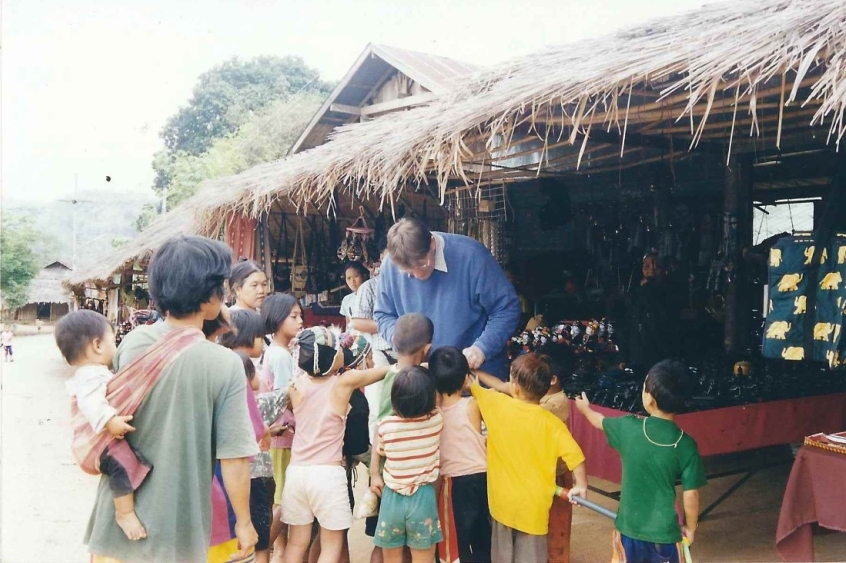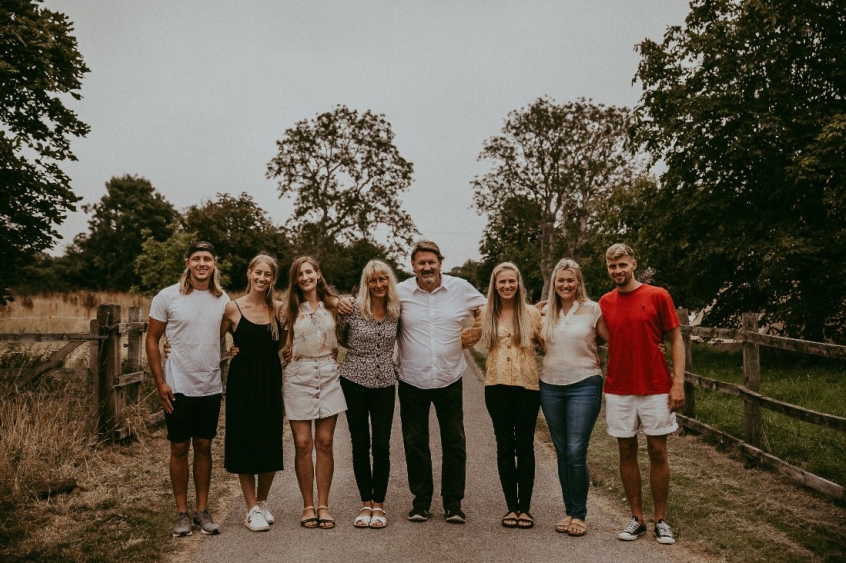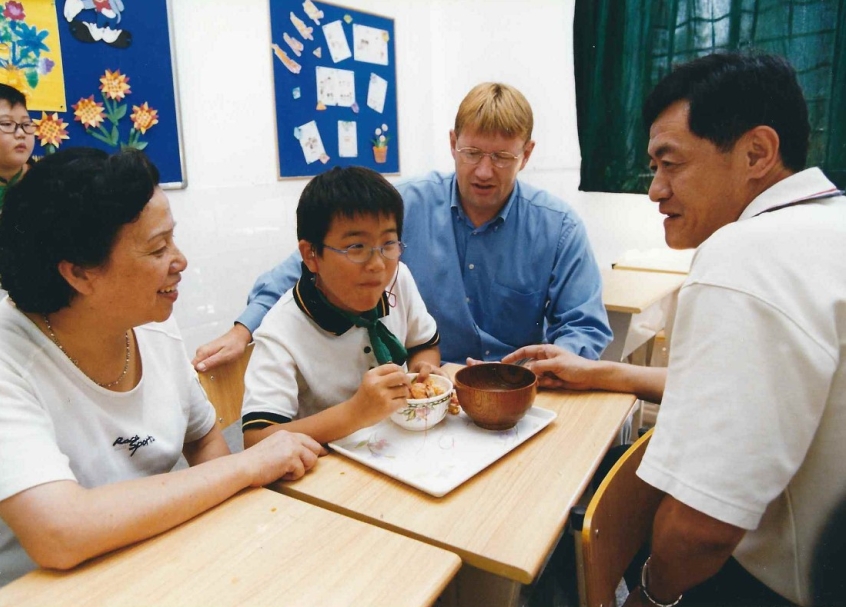
For over 25 years, Robert Glover has been working to help children in China's orphanages find loving homes - an amazing story that is told in his recent book and documentary narrated by Bear Grylls.
His groundbreaking work with Care for Children was the first ever joint social venture between the UK and Chinese government and, to date, has seen a million children in China find love and acceptance with a family.
None of it would have been possible without the support of his wife, Elizabeth, who made the move to China with him along with their six children and shared his passion to find loving families for orphaned and vulnerable children.
Robert and Elizabeth speak to Christian Today about their work in China and why the Church needs to get behind the shift from orphanages to family-based care.
CT: Robert, you did quite a few different jobs before you started this pioneering work in China. When did you feel a clear call to help children in China and were you surprised by that sense of calling and where it was taking you?
Robert: Actually there was a bit of a thread running through my life and looking back, I can see how seeds were planted, because I remember being at school in Norwich, which at the time was very white, and a Chinese boy started coming to my school. I noticed he was getting bullied, but he was very good at art and I wasn't, so I struck a deal with him: I'd take care of him if he helped me with my art O Level!
And I think I'd always had a fascination with China. When I was in the Royal Navy, I really hoped I could be put on a guided missile destroyer from Plymouth to the Far East but instead I was put on a submarine up to the Baltics, so it wasn't to be!
It wasn't until much later, when I was married to Elizabeth with six children, that we both sensed we didn't just want to sit around. We wanted to go and do something and be effective for God. So we prayed that God would use us and of course that's a very dangerous prayer! It was in the early 90s that things started to move towards China and by that time, I had been involved in social work for some years but I hadn't realised that God would use those years of social work and management and training for China.
CT: Elizabeth, did you share in that sense of calling to China or was it more about trusting God and supporting your husband in what he was being called to do?
Elizabeth: Yes, I think it was exactly that. When we got married we would ask each other: if you could go anywhere in the world where would you go? And Robert would always say somewhere like Asia or China and I'd say somewhere like the Seychelles! I was raised in a little fishing village in Norfolk and I just wanted to get married, have a house and lots of children, and live the good life!
Around the mid-90s there was a real sense of the Holy Spirit moving powerfully through the churches, lots of things were happening and we really felt that we wanted to give God everything and that we wanted to serve God wholeheartedly. We had been praying as a family for about a year, saying, 'just use us, use us, use us,' but when I realised we were going to China I was a bit shocked because we lived on Guernsey at the time, which is a very idyllic place with about 60,000 people, and we lived in a 400-year-old farmhouse with lots of chickens.
When God said 'I want you to go to China', because we had been praying for a year, I just thought to myself, if that's where God is saying to go, I'll just go; I might not feel like I want to go but I'll just go. At that time, someone at our church suggested we go and take a look first to make sure it was alright for our six children so in 1997 we flew to Shanghai via Hong Kong and I'd never done a longhaul flight or really travelled much before then.
Someone had paid for us to stay in a very grand hotel but it was a stark contrast to the homelessness we saw on the streets and the Shanghai State Orphanage where babies were in rows and rows of cots. It smelled of urine, they had sores on their heads, their milk bottles were just propped up against their cots so they weren't even being picked up or given any eye contact and they were just whimpering.
It was devastating and back at the hotel I just had a really real time with God and I said, 'God, I don't think I can do this, I don't think I can come here and bring my six children here.' After saying that prayer, I felt God speak right into my heart that 'you don't have to do this' and it totally released me because all along I had been feeling like I've just got to do it.
When God said 'you don't have to', at that point I just wept and felt this peace flood into my heart and I knew that I could do it, I could help these children, and that God was with us. There was such a strong sense of peace that God had taken me on this journey to a place where I really wanted to do it and it wasn't about going to China or having these experiences; it was purely because I wanted to help those children. God equipped me in that moment.
CT: Robert, did you share that same feeling of devastation when you went into the orphanages?
Robert: I had gone and visited an orphanage earlier in '96 and was pretty challenged by it. I said to the staff 'why aren't you taking care of this and that?' and I realised that they just didn't know what to do. Rather than being critical, I realised that I needed to give them a solution to the problem. Because of the one child policy, there were just so many children in these institutions, they were overburdened and they just didn't have the capacity to look after them all. The staff really didn't know what to do and just needed some training and I could see that if we could place the children into families in their local communities, then it would release the capacity to take care of them properly, because God made the family for children and children are best cared for in families.

CT: You were inspired by your Christian faith to do this work but could you be open about that with the Chinese government?
Robert: Certainly in the early days, we were just going in as professionals but I was a Christian professional and over time they learned to respect both. They respected that we were professional and doing a professional job and helping them develop something that was good and healthy for their children. Family care is intrinsic to Chinese culture so it wasn't something I had to sell hard but over time they got to know my Christian faith as well and only had respect for it.
One time, about 10 years into the project, I went with a Beijing official to Baotou in Mongolia and on the train he was telling me that everyone up there was Muslim, Confuscious and Buddhist, and that there were no Christians there. After we arrived, we had dinner with the first 20 families and the official told a joke about me being an Englishman and a Christian. Nobody laughed so he told the joke again and slowly the first lady raised her hand and said, "I'm a Christian too," then another hand went up and another hand. It turned out, they were all Christians.
On the way back, the official asked me, "Why are the Christians doing this?" And I explained that it was part of our DNA and showed him the Scriptures. We were all orphans once and we were adopted into God's family. God calls himself our Father and His Son is Jesus and He is our salvation and we are the family of God.
The official started to get the message that this is part of our DNA, that God loves the orphan and loves to set them into good families. The official then said he was going to go and do some research to see how many of the families taking in children were Christian and later he came back and told me that 80 per cent of the families in the three provinces where the project was running were Christian.
I think sometimes we get too obsessed about going in with our agenda and we just need to do what God tells us to do. The piece of the jigsaw puzzle God gave me allowed Him to reveal himself to the people and that was a great lesson for me because if I'd gone in there and tried to evangelise or recruit Christian families from the beginning, I wouldn't have lasted even a few weeks. But because God had a bigger jigsaw puzzle and I did my piece, it allowed him to reveal Himself in the nation.
CT: Elizabeth, were you involved in this work or more supporting from behind the scenes?
Elizabeth: Because we had six children, including a set of four-year-old twins at the time, and because we were promoting family life, we had a strong sense that we needed to do family well. We couldn't justify going in and working to help other children if we weren't looking after our own children well, so I was a full-time mum with six children. But we would visit the orphanage together and help feed the children. And God had moved our hearts for the poor and needy so we often brought homeless people to our home and fed and clothed them. There were also Chinese Christians around us that we got to know and through them we could share the Gospel with these people and lots became Christians as a result of that. I was very much involved in that with our children.
CT: It sounds like it was very much a whole-family commitment?
Elizabeth: We felt very much that God had called the family and it was a part of our children's destiny, and their calling, and their experiences. And the way we looked at it was that it wasn't a ministry, it was a life. It wasn't about just popping into church and coming back and then doing an outreach. We were in China because we believed God was calling us and that the whole of our life there was part of that calling. It was an amazing time for our children to learn about the things of God and the character of God and how to walk with Him, listen to Him and respond to Him.

CT: Robert, what change did you see in the children after they were placed into families? How different was it from the orphanage?
Robert: There was tremendous transformation and the pilot project was a great opportunity to show the officials the benefits of family life. Once they saw the outcome in the children's lives, it quickly became a national programme replicated right across the country.
In our documentary, Children of Shanghai, we visit five children who were placed in families 20 years ago. One was very challenged academically but thanks to the tremendous love and encouragement of his family, went on to university and now works for one of the biggest companies in the world. Another little girl had cerebral palsy and couldn't eat solids or walk or talk. Twenty years later, she presented me with the gold medal she won at the Sydney Paralympics. The documentary only has enough time for five stories but we believe there are a million good news stories of these children in China.
God made the family for children; that's the created order. Yet for some reason we put them in these warehouses when we know it damages them. Children who have been raised in orphanages are more likely to develop all kinds of mental and physical disabilities and suffer from attachment disorders and social problems. As Christians, it's not surprising that when we put children back in families, the outcomes are astonishing. It's a real ashes to beauty story once you understand theologically that we were all orphans once and God adopted us into his family.
CT: How do the families benefit from this? Is it transformative for them as well?
Robert: I went to a village in Sichuan province and a lady there gave me a big hug and thanked me for transforming her family. In China, the whole family often lives together and so with this particular family, the aunts and uncles were living around the same courtyard. They had one son who went off to university and when he left the home, her husband started to drink and gamble and they started arguing so the other relatives moved out and the house felt empty and she was pretty lonely. Then the opportunity arose to take in a five-year-old girl and everything changed. Her husband would come home from work and read to this little girl, and this woman was so happy to pass on her craft and cookery skills. One by one, the other relatives moved back into the courtyard and she told me they had just celebrated the best Chinese New Year. We were just trying to help this one child but it's amazing that God benefited not only that little girl but the whole family by bringing them back into unity.
CT: Has the Chinese church been involved in the project?
Robert: In the beginning we only worked with the government. Then in 2008, the Sichuan earthquake happened and in the aftermath, I met someone from Wuhan who oversaw the urban house church. Once I explained to him theologically why we should take care of the orphans, he mobilised locals and as a result of that, many of the families that came forward to take in a child were from that urban house church network.
CT: In many ways you were ahead of your time but a movement away from orphanages is slowly emerging. What lessons have you learned?
Robert: When we started, we were very isolated and the pendulum was very much towards orphanages. That pendulum has gradually swung back the other way and In 2019, the UN passed a resolution to phase out orphanages and promote family alternatives.
The one group still lagging behind and supporting orphanages, though, is the Church and it's shocking really because we know that God made the family for children, so why are we supporting orphanages? Of course, when children have nothing else, there may be no other option, but the Church has got to wake up and see where there are opportunities for children to experience family life because that is the most healthy experience they will ever have growing up.
Working in China has been incredibly beneficial for us. The Chinese are very humble, and gracious, they are very good at doing family and community, and sociologists know that when you have strong families, you have strong communities, strong societies and strong economies. It's not surprising that while we were in China developing family placement, China grew in all of those areas.

Sadly, we came back to the UK and found broken families, broken communities and a broken society. We need to return to the good, strong family values we are actually renowned worldwide for. The whole of the British Empire was built on strong family values and for some reason we threw it all out and then wonder why we are where we are.
Elizabeth: One thing that's important to note is that at Care for Children we promote permanent placements. Children are placed into families for the long term - not a month or a few months or a few years. They are with that family until independence. They are supported with education and healthcare and the family is also supported too. In the West, so many children are moved from pillar to post and have to constantly adjust. All that could change if we supported the whole family to foster or adopt.
Robert: The interesting thing now is that I'm being invited to talk to the Florida government and the Greek government. The feeling is: if we can place a million children back into families in China and restore their sense of love and belonging, we can do it here too.
CT: You've written about your experiences in your book "As Many As the Stars". What's the inspiration behind the name?
Robert: Many years ago in Guernsey a gentleman prayed for me in our church and he said, "I sense you are going to be father to as many children as there are stars in the sky," and I thought, that's strange, because there are a lot of stars up there!
When I went to China, the Chinese officials I was meeting with decided I should have a Chinese name and the meaning of it in English is, 'As many stars as there are in the sky, you will be father to children in China.' It was amazing to hear this so many years after that man in Guernsey gave me that word in. It was confirmation about what I was doing and was almost like an Abrahamic call!













